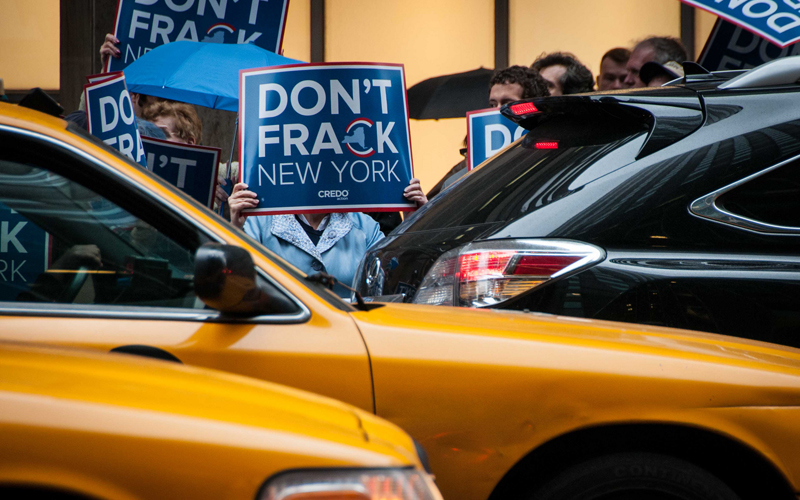Photo by /Flickr, licensed under CC 2.0
by guest blogger Maya K. van Rossum, the Delaware Riverkeeper
Where were you when New York banned fracking? December 17, 2014, has now joined the list of “where were you when” moments for everyone involved in the fight to end fracking in the U.S.
Based on an extensive review of the science regarding the health, environmental, and community impacts of high-volume hydraulic fracturing (fracking)—a new process being used to shatter underground rock formations to extract shale gas—New York has banned the practice. The state’s prohibition on fracking means that New Yorkers will be spared the harmful effects of industrial shale gas extraction.
Why did New York decide to make this landmark decision? While reviewing shale gas and fracking processes, the state identified a number of harms to human and environmental health, as well as economic issues inflicted by the shale gas extraction industry.
According to New York’s thorough five-year review, destructive impacts of shale gas extraction could include:
- Reduced air quality
- Polluted drinking water
- Soil and water contamination
- Surface water contamination
- Induced earthquakes
- “Boomtown economic effects,” including “increased vehicle traffic, road damage, noise, odor complaints”
- Climate change.
New York’s detailed analysis stands in stark contrast to Pennsylvania’s approach. The commonwealth has moved full-steam ahead despite mounting evidence of the harms caused by this extreme industrial practice.
In Maryland, fracking isn’t currently happening, but that may change soon. Governor Martin O’Malley recently said that, while there is “no doubt” that shale gas extraction is a threat to public health, the environment, and important natural resources, the state will put in place regulations that will manage these harms so they are kept to an “acceptable level.” But if your tap water has been so polluted you can’t safely drink or bathe in it; if your air has been poisoned; if your lungs have been harmed or your body contaminated; if you now live in the shadow of the 24/7 lights, noise, and stink of a nearby industrial well site and the 1,400 to 4,000 truck trips it requires, there is no acceptable level.
As revealed in Unsafe & Unsustainable, a recent analysis of voluntary “performance standards” purported to make shale gas extraction safe and sustainable, this is an industry that cannot be made safe. Time and again, standards put forth suggesting that shale gas extraction can be done safely are found wanting, the task, unachievable.
The sad reality is that in Pennsylvania and Maryland, these decisions are being driven by politics, not science. When politics are taken out of the analysis, the full depth and breadth of harm from shale gas extraction is honestly and earnestly revealed and recognized. When the Pennsylvania Supreme Court was asked to render a ruling about the impacts of shale gas extraction, in a legal forum not driven by politics, but by law and facts, Chief Justice Ron Castille wrote:
By any responsible account, the exploitation of the Marcellus Shale Formation will produce a detrimental effect on the environment, on the people, their children, and future generations, and potentially on the public purse, perhaps rivaling the environmental effects of coal extraction.
We all need pure water, clean air, and the healthy environment necessary to support and sustain healthy lives, yet political leaders fail to give environmental rights the same protections they give other fundamental rights like freedom of speech.
Shale gas extraction is an extreme example of our right to healthy lives’ being bargained away for political capital. But it doesn’t have to be that way. New York Governor Andrew Cuomo has set the standard we can and should demand of all politicians: Put the rights and lives of the people before the profits of industry.
In fact, in the pursuit of energy, you can support people and profits simultaneously—just make the energy industries you advance are the ones that provide truly clean and sustainable energy options (go to thesolutionsproject.org to learn how your state can be fueled by sustainable energy in a matter of decades).
Now is the time to recognize that we all have inherent and indefeasible rights to pure water, clean air, and a healthy environment. These are rights we must demand for ourselves and protect for the generations yet to come (learn more about what you can do to demand your environmental rights through our For the Generations program).
As the Post Carbon Institute’s Drilling Deeper report documents, the life of the shale gas industry will be but a few decades. We are all better served by investing now in clean energy options that will fuel our future and protect our air, water, sustainable jobs, economy, and lives.
 Maya K. van Rossum is the Delaware Riverkeeper, and has led the Delaware Riverkeeper Network (DRN) since 1994. The DRN is a regional nonprofit advocacy organization that monitors the river and all of its tributaries for threats and challenges, and advocates, educates, and litigates for protection, restoration, and change.
Maya K. van Rossum is the Delaware Riverkeeper, and has led the Delaware Riverkeeper Network (DRN) since 1994. The DRN is a regional nonprofit advocacy organization that monitors the river and all of its tributaries for threats and challenges, and advocates, educates, and litigates for protection, restoration, and change.





I wish the energy around stopping fracking were available to stop mountaintop removal mining, for which words like “nightmare” aren’t even adequate. I would trade fracking for mountaintop mining any day.
I also wish this much energy would go into pushing for alternatives to shale.
Yes, I know both get some attention. But not like fracking, which is on everyone’s mind and in everyone’s conversations.
I wish the options were as clear as both sides make them appear.
Because when we run out of available energy resources. . . we have to go with shale . . . or nuclear, if we plan to continue to exist beyond the next few decades.
BTW, while I am hesitant about fracking, inclined to be against it . . . I must say that it has been done on my grandparents’ family farm down south for a few years now. There have been thus far zero detrimental effects locally. Hundreds of local families have been lifted out of poverty, though, by the economic opportunity.
Of course, it’s just a small sampling and may be a blip on the scale of “would cause” and “could cause” negatives that are being projected if fracking goes more widespread. This good experience in the face of probability makes it tough for me to be as anti-fracking as I feel I ought to be.
Not just Pennsylvania, but every State in this Nation should ban fracking as New York has done! And if the politicians cared as much about the people as they do their wallet, it would already have happened!! When did the wealth of a few 1% of the population become the Law of the Land?? When did the people we elect stop caring about not only us, but their own children and grandchildren? If we don’t take care of our earth now, there will be no future for the children and why does that NOT matter to the people in charge?? Thank you, Maya, for all the work you are doing to try to help us and those who will live on after we are gone.
Natural gas development also destroys property values; Having a drill site near a home will never increase the value of the home, no matter the market. You can’t sell it (at least not for even what you paid for it) and you can’t stay. Also, more and more banks are refusing to mortgage, and good luck with finding an insurance company.